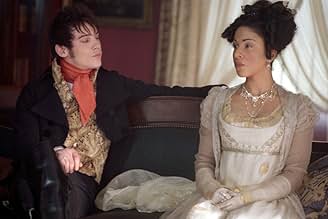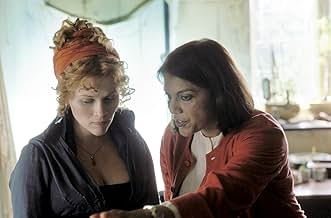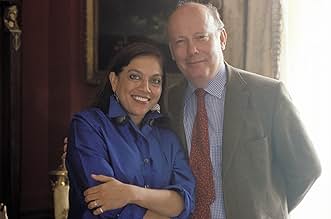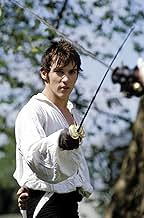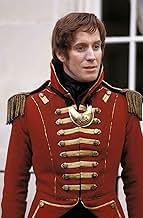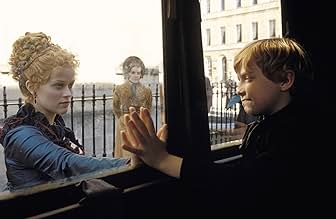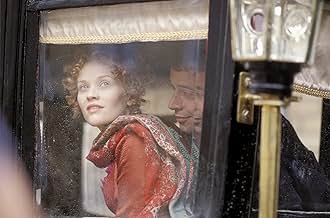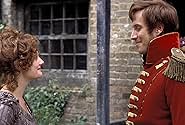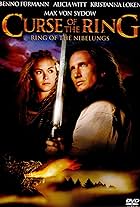Growing up poor in London, Becky Sharp defies her poverty-stricken background and ascends the social ladder alongside her best friend, Amelia Sedley.Growing up poor in London, Becky Sharp defies her poverty-stricken background and ascends the social ladder alongside her best friend, Amelia Sedley.Growing up poor in London, Becky Sharp defies her poverty-stricken background and ascends the social ladder alongside her best friend, Amelia Sedley.
- Awards
- 2 wins & 5 nominations total
Lillete Dubey
- Ms. Green
- (as Lillette Dubey)
Featured reviews
I had the somewhat unfortunate job of accompanying two teenage girls to my viewing of Vanity Fair. As any cinema attendee will know, there is nothing more irritating then two talkative teens, with the attention span of goldfish, chatting throughout the entire film. All their interest was well gone by the time Gabriel Byrne strutted onto the screen, and although it pains me to admit it, my interest had slowly subsided with theirs.
Although beautiful shots, skillful performances and magnificently designed sets came bountiful, there was still one vast absence that was so dearly missed. This was the charm, the charisma and the fascination that connects the audience with the characters. The scenes didn't fuse well and felt shabbily thrown together. Acknowledged events came as surprises and characters lost their appeal and distinctiveness. Becky Sharp, played by Reese Witherspoon, became aggravating and tedious, and any sympathy, understanding or patience for that matter, was lost to a plot so drawn and witless, it made 'Charlie's angels' seem thought provoking.
The charm and the magic of the William Makepeace Thackeray novel were forgotten in this drawn and soulless remake of a classic. Worth the watch for the costumes and set alone, but expect nothing more.
Although beautiful shots, skillful performances and magnificently designed sets came bountiful, there was still one vast absence that was so dearly missed. This was the charm, the charisma and the fascination that connects the audience with the characters. The scenes didn't fuse well and felt shabbily thrown together. Acknowledged events came as surprises and characters lost their appeal and distinctiveness. Becky Sharp, played by Reese Witherspoon, became aggravating and tedious, and any sympathy, understanding or patience for that matter, was lost to a plot so drawn and witless, it made 'Charlie's angels' seem thought provoking.
The charm and the magic of the William Makepeace Thackeray novel were forgotten in this drawn and soulless remake of a classic. Worth the watch for the costumes and set alone, but expect nothing more.
Vanity Fair is a beautiful film, with gorgeous scenery and amazing costumes. However, it takes a great deal of concentration to figure out exactly what is going on.
Becky Sharp is the daughter of an artist and a chorus girl, far from respectable parents. When she finishes school, she does all she can to try to pull herself up in society, using her wit, intelligence, and sexuality. She ruthlessly climbs the social class ladder, but might have hit a small bump when she let herself fall in love.
The movie, while it has good intentions, fails to provide a smooth running plot. Instead, it it simply a viewing of the ways of Becky, played perfectly by Reese Witherspoon. Reese shines in the role, bringing humanity to the character, and makes you like Becky, despite her often malicious ways. However, not even she can make the plot clear in the first viewing. It took me a second time to love this movie.
The exotic feel of the Indian scenes is the best part, especially when Becky performs an Indian dance for the king. Its a beautiful scene. Also, the affection between Becky and Rawdon (a great James Purefoy) is endearing. A great movie, if you have the patience to figure it out.
Becky Sharp is the daughter of an artist and a chorus girl, far from respectable parents. When she finishes school, she does all she can to try to pull herself up in society, using her wit, intelligence, and sexuality. She ruthlessly climbs the social class ladder, but might have hit a small bump when she let herself fall in love.
The movie, while it has good intentions, fails to provide a smooth running plot. Instead, it it simply a viewing of the ways of Becky, played perfectly by Reese Witherspoon. Reese shines in the role, bringing humanity to the character, and makes you like Becky, despite her often malicious ways. However, not even she can make the plot clear in the first viewing. It took me a second time to love this movie.
The exotic feel of the Indian scenes is the best part, especially when Becky performs an Indian dance for the king. Its a beautiful scene. Also, the affection between Becky and Rawdon (a great James Purefoy) is endearing. A great movie, if you have the patience to figure it out.
William Makepeace Thackeray's novel "Vanity Fair" is a satire telling of the rise, fall and rise again of the social-climbing adventuress Becky Sharp. Like a number of other literary heroines from this period, most notably Charlotte Bronte's Jane Eyre, Becky starts life as a governess, although she and Jane Eyre are completely different in character. Whereas Jane is morally upright and deeply religious, Becky is scheming and unscrupulous. (Her surname has an obvious symbolic meaning). She marries Rawdon Crawley, an Army officer and the younger son of her employer, becomes the mistress of the wealthy Lord Steyne and, after various reverses of fortune, ends up as the wife of a senior official with the East India Company.
Thackeray's title is taken from Bunyan's "Pilgrim's Progress" and refers to a fair which was intended to symbolise man's sinful attachment to the things of this world. His intention was to satirise the snobbishness, hypocrisy and worldliness of British society. Although the events described in the novel take place in the 1810s and 1820s, two or three decades before it was published in 1848, he clearly intended it to have a contemporary relevance, and his readers would have had no difficulty identifying the Becky Sharps and Lord Steynes of their own day.
The author described it as a "novel without a hero", and few, if any, of its characters are intended to come across as sympathetic. We may admire Becky's cunning and determination, but her ruthlessness and amorality mark her out as the novel's anti-heroine rather than its heroine. Her husband Rawdon is as amoral as her, and considerably more stupid. Steyne (pronounced "stain"- another symbolic name) is a libertine and a bully. Rawdon's father Sir Pitt Crawley is an oafish vulgarian and his brother Pitt junior a pompous prig. Becky's friend Amelia Sedley is, unlike Becky herself, morally upright, but is also rather dull, lacking in intelligence and a poor judge of character. She persists, for example, in believing, in the teeth of all the evidence, that her rakish fiancé George Osborne, who later becomes her husband, is a paragon of virtue.
The novel has been the subject of numerous television and film adaptations, although this is the only one I have seen apart from the British television version from the late eighties. That adaptation kept to Thackeray's plot reasonably faithfully, but scriptwriter Julian Fellowes and director Mira Nair evidently thought that that plot would not work on the big screen because they made a number of changes, most notably to the character of Becky, who becomes far more sympathetic than she was in the original. (There was, apparently, an earlier discarded screenplay in which Becky's character was closer to the way she is depicted in the novel). The character of her husband Rawdon is also somewhat sanitised, and even Steyne at first seems more like a kindly benefactor than a sexual predator. It is only at the end that he reveals himself in his true colours.
No film based upon a novel, especially a novel as complex as "Vanity Fair", can ever be 100% faithful to the original, and a number of literary adaptations have been highly successful films in their own right despite departing considerably from their source material. This, however, is not really one of them. If you want to make a film about a feisty young proto-feminist in the Regency era- which is how Fellowes paints Becky- I would not really recommend using Thackeray's novel as a starting-point. Deprived of much of its satirical content, "Vanity Fair" becomes emasculated, just another "heritage cinema" British costume drama.
Yet this is not entirely a bad film. Reese Witherspoon makes Becky into an appealing heroine, and cannot be held personally to blame for the fact that the character she is playing is far from being the one that Thackeray created. Her British accent is perhaps not 100% reliable, but this is not so important in period drama, as we do not know exactly how people spoke in the early nineteenth-century, and the difference between British and American accents may have been less marked than it is today. There are also some good performances in cameo roles from the likes of Bob Hoskins as the uncouth Sir Pitt and Eileen Atkins as his wealthy and autocratic sister Miss Matilda.
Another attractive feature is the visual look of the film. Nair was clearly aiming to reproduce the look of an Old Master painting, and does this by the use of strong, vivid colours, especially reds and greens, shot through a filter which gives a slightly yellow tint, like a picture seem through a protective layer of varnish. I felt, however, that this is a film which could have been improved had it followed the original novel more closely. 6/10
Thackeray's title is taken from Bunyan's "Pilgrim's Progress" and refers to a fair which was intended to symbolise man's sinful attachment to the things of this world. His intention was to satirise the snobbishness, hypocrisy and worldliness of British society. Although the events described in the novel take place in the 1810s and 1820s, two or three decades before it was published in 1848, he clearly intended it to have a contemporary relevance, and his readers would have had no difficulty identifying the Becky Sharps and Lord Steynes of their own day.
The author described it as a "novel without a hero", and few, if any, of its characters are intended to come across as sympathetic. We may admire Becky's cunning and determination, but her ruthlessness and amorality mark her out as the novel's anti-heroine rather than its heroine. Her husband Rawdon is as amoral as her, and considerably more stupid. Steyne (pronounced "stain"- another symbolic name) is a libertine and a bully. Rawdon's father Sir Pitt Crawley is an oafish vulgarian and his brother Pitt junior a pompous prig. Becky's friend Amelia Sedley is, unlike Becky herself, morally upright, but is also rather dull, lacking in intelligence and a poor judge of character. She persists, for example, in believing, in the teeth of all the evidence, that her rakish fiancé George Osborne, who later becomes her husband, is a paragon of virtue.
The novel has been the subject of numerous television and film adaptations, although this is the only one I have seen apart from the British television version from the late eighties. That adaptation kept to Thackeray's plot reasonably faithfully, but scriptwriter Julian Fellowes and director Mira Nair evidently thought that that plot would not work on the big screen because they made a number of changes, most notably to the character of Becky, who becomes far more sympathetic than she was in the original. (There was, apparently, an earlier discarded screenplay in which Becky's character was closer to the way she is depicted in the novel). The character of her husband Rawdon is also somewhat sanitised, and even Steyne at first seems more like a kindly benefactor than a sexual predator. It is only at the end that he reveals himself in his true colours.
No film based upon a novel, especially a novel as complex as "Vanity Fair", can ever be 100% faithful to the original, and a number of literary adaptations have been highly successful films in their own right despite departing considerably from their source material. This, however, is not really one of them. If you want to make a film about a feisty young proto-feminist in the Regency era- which is how Fellowes paints Becky- I would not really recommend using Thackeray's novel as a starting-point. Deprived of much of its satirical content, "Vanity Fair" becomes emasculated, just another "heritage cinema" British costume drama.
Yet this is not entirely a bad film. Reese Witherspoon makes Becky into an appealing heroine, and cannot be held personally to blame for the fact that the character she is playing is far from being the one that Thackeray created. Her British accent is perhaps not 100% reliable, but this is not so important in period drama, as we do not know exactly how people spoke in the early nineteenth-century, and the difference between British and American accents may have been less marked than it is today. There are also some good performances in cameo roles from the likes of Bob Hoskins as the uncouth Sir Pitt and Eileen Atkins as his wealthy and autocratic sister Miss Matilda.
Another attractive feature is the visual look of the film. Nair was clearly aiming to reproduce the look of an Old Master painting, and does this by the use of strong, vivid colours, especially reds and greens, shot through a filter which gives a slightly yellow tint, like a picture seem through a protective layer of varnish. I felt, however, that this is a film which could have been improved had it followed the original novel more closely. 6/10
This is an entertaining movie that goes over two hours, but I really don't understand why it was made. Sprawling stories spanning several decades with several subplots involving dozens of characters are totally defensible on the printed page, where we can always go back and remind ourselves which character is which and how this character is related to that one. But this type of thing makes no sense whatsoever in a film. Unless a viewer has a phenomenal memory, such a story on film invariably leads to confusion and to my asking myself, "now wait a minute, whose brother is this, and whose son?"
So that is one of the principal problems with this film.
There are several other problems as well. Reese Witherspoon is badly miscast. She simply lacks Becky Sharp's bite. In fact, the whole film lacks Thackeray's bite. Reese does a good job with the British accent, but it just doesn't work. She is just too American for the role. Weren't there any British actresses available, or were the producers just relying on Reese's star power? Reese is just too nice to play Becky.
It has often been said that Becky Sharp was the model for Scarlett O'Hara in "Gone With the Wind," although Margaret Mitchell denied this. Even so, I kept visualizing Vivien Leigh in this role and imagining how perfect she would have been. I think Mira Nair was thinking of GWTW as well, because there are several scenes in the film that are obvious homages to it. First there are the battle scenes during the Battle of Waterloo, followed by a panoramic view of the carnage following the battle, complete with corpses strewn all over the battlefield. This was an obvious homage to the crane shot over Atlanta in GWTW. The final fight between Becky and her husband reminded me of the final fight between Scarlett and Rhett in GWTW. I half expected the husband to say "Frankly, my dear, I don't give a damn."
Another flaw involves the Indian director Nair's inability to resist bringing in some Bollywood type scenes, particularly one involving Becky leading an Indian type dance, with Indian music, before the king, no less, and to thunderous applause.
And yet another thing: this film spans at least twenty, maybe twenty-five or thirty, years in Becky's life after she graduates from finishing school--I am not counting the one scene of her as a child--yet the character never ages. Neither do any of the other characters. Maybe the makeup staff went on strike?
But most of these problems won't even be noted by someone who hasn't read the book, so if you haven't, go ahead and see it; you'll probably be entertained. And if you are someone like me who loves the book, you may not be able to resist seeing it anyway. But Thackeray was never so soft.
So that is one of the principal problems with this film.
There are several other problems as well. Reese Witherspoon is badly miscast. She simply lacks Becky Sharp's bite. In fact, the whole film lacks Thackeray's bite. Reese does a good job with the British accent, but it just doesn't work. She is just too American for the role. Weren't there any British actresses available, or were the producers just relying on Reese's star power? Reese is just too nice to play Becky.
It has often been said that Becky Sharp was the model for Scarlett O'Hara in "Gone With the Wind," although Margaret Mitchell denied this. Even so, I kept visualizing Vivien Leigh in this role and imagining how perfect she would have been. I think Mira Nair was thinking of GWTW as well, because there are several scenes in the film that are obvious homages to it. First there are the battle scenes during the Battle of Waterloo, followed by a panoramic view of the carnage following the battle, complete with corpses strewn all over the battlefield. This was an obvious homage to the crane shot over Atlanta in GWTW. The final fight between Becky and her husband reminded me of the final fight between Scarlett and Rhett in GWTW. I half expected the husband to say "Frankly, my dear, I don't give a damn."
Another flaw involves the Indian director Nair's inability to resist bringing in some Bollywood type scenes, particularly one involving Becky leading an Indian type dance, with Indian music, before the king, no less, and to thunderous applause.
And yet another thing: this film spans at least twenty, maybe twenty-five or thirty, years in Becky's life after she graduates from finishing school--I am not counting the one scene of her as a child--yet the character never ages. Neither do any of the other characters. Maybe the makeup staff went on strike?
But most of these problems won't even be noted by someone who hasn't read the book, so if you haven't, go ahead and see it; you'll probably be entertained. And if you are someone like me who loves the book, you may not be able to resist seeing it anyway. But Thackeray was never so soft.
'Vanity Fair' is the perfect title for this story, showing us a world of cold characters with impersonal motives; a world where marriage is just another move in a chess game where the opponent is poverty and, perhaps more importantly, unpopularity. At the center of this movie is Becky Sharp (Reese Witherspoon), a beautiful blonde from a terribly poor family (her father was a talented but poor artist). We meet her first when she is a young girl, and we see that she is already stubborn and manipulative, when she demands ten guineas for a portrait of her mother that is being sold to a wealthy aristocrat (Gabriel Byrne) for four. He agrees, probably not because he thinks it's worth it, but because he admires the fire and spirit in the young girl. He'll come into play later.
We see her next after completing finishing school and being sent off to be a governess for Sir Pitt Crawley (Bob Hoskins), a scruffy old man who's just barely getting by, with a dusty mansion and rude servants. She leaves for Pitt with her friend Amelia (Romola Garai), who is engaged to an officer George Osborne (Jonathan Rhys-Meyers). Amelia's engagement does not stop her from talking to Becky about the benefits of marrying a wealthy man, and it is here that we first see the mindset of most of the women in the film. Since they don't have many promising career prospects (those were for the men) they want to seduce a rich man to gain wealth, and popularity, and happiness too, I guess.
And Becky is great at playing the game. When she stays with Amelia's family in London before going to the Crawleys, she meets Amelia's awkward (and heavy) brother (Tony Maudsley), a wealthy man from India, and starts a seduction that is in a way kind of obvious, but she knows that the insecure Joseph couldn't possibly see through it. And he doesn't, he wants to marry her, and she wants that, but it's George who talks him out of it.
So, Becky is finished with her detour and moves to the Crawley's, where she teaches his kids perfect French and even cleans up the mansion when his wealthy sister Matilde (Eileen Atkins) arrives. Matilde is an undeniable snob who claims to have a romantic heart, but with mean put-downs ready for everyone in the house. She takes a liking to Becky for her own cleverness and invites her to live with her and her nephew Rawdon Crawley (James Purefoy) in London. Becky accepts, of course, it's another step up.
So, she is back in London and reunites with Amelia, George, and George's soldier friend William Dobbin (Rhys Ifans). She also recognizes Matilde's neighbor, Lord Steyne, the man who bought her mother's portrait all those years ago. She's back in the game, but she falls prey to her heart and elopes with Rawdon, angering Matilde enough to cut Rawdon out of her will (she loves romantic stories, she says, but not in real life!).
Becky hasn't been completely consumed by her love, though. She still has that cunning agenda of her own, which includes getting pregnant in hopes of gaining sympathy from Matilde, and attending all the major parties, shows and banquets in London despite her lower class.
But Rawdon is a gambler and their wealth and public image starts to drop significantly. This is when we see the extent of Becky's agenda, when she accepts Steyne as her mentor, despite his A) being a horrible man and B) clearly wanting Becky for his bedroom, not his student. But Steyne is seductive in his own right, and buys Becky the most expensive and beautiful jewelry, shows her to great parties and even casts her as the lead in a dance show he directed. Their relationship is one of the most intriguing points of the film, kind of similar to that of Fast Eddie Felson and Bert Gordon, and Laura Hunt and Waldo Lydecker.
Despite most of its characters being cunning and sinister, 'Vanity Fair' is a distinctly moral movie. Pitt Crawley Jr. (Douglas Hodge) is awkward and kind of dull, but his honesty and kindness gives him a stable, happy life, and Joseph's own earnestness pays off for him in the end. But the most important is the story of William Dobbin's undying love for Amelia, and how he's so gentlemanly about it. He doesn't urge her into adultery, and when she mistakes a piano he's bought for her for a present from George he doesn't correct her. I won't say how this story ends, but it'll most likely pull a tear from the girls in the audience. Ifans' is a fantastic, heartbreaking performance, the best of the movie.
Mira Nair's direction is awesome as well, what other director could make a passable (even good) glittery, belly-dancing scene in a Victorian drama. The Oscar for costume design will most certainly go to this, and its set design makes the best competition to 'The Terminal' so far this year.
As for acting Oscars, well, the way the movie switches from story to story doesn't quite let us get to know most of the characters, but some great performances can still be found here. Particularly Rhys Ifans, whose performance is so quiet and strong, and Eileen Atkins, who is perfect and hilarious, a true scene-stealer of her performance (and maybe even Byrne, too).
And then there's Witherspoon, in one of her best performances as Becky Sharp, the girl who, after learning her lesson by the end, is so stubborn that she's at it again, 7.5/10.
We see her next after completing finishing school and being sent off to be a governess for Sir Pitt Crawley (Bob Hoskins), a scruffy old man who's just barely getting by, with a dusty mansion and rude servants. She leaves for Pitt with her friend Amelia (Romola Garai), who is engaged to an officer George Osborne (Jonathan Rhys-Meyers). Amelia's engagement does not stop her from talking to Becky about the benefits of marrying a wealthy man, and it is here that we first see the mindset of most of the women in the film. Since they don't have many promising career prospects (those were for the men) they want to seduce a rich man to gain wealth, and popularity, and happiness too, I guess.
And Becky is great at playing the game. When she stays with Amelia's family in London before going to the Crawleys, she meets Amelia's awkward (and heavy) brother (Tony Maudsley), a wealthy man from India, and starts a seduction that is in a way kind of obvious, but she knows that the insecure Joseph couldn't possibly see through it. And he doesn't, he wants to marry her, and she wants that, but it's George who talks him out of it.
So, Becky is finished with her detour and moves to the Crawley's, where she teaches his kids perfect French and even cleans up the mansion when his wealthy sister Matilde (Eileen Atkins) arrives. Matilde is an undeniable snob who claims to have a romantic heart, but with mean put-downs ready for everyone in the house. She takes a liking to Becky for her own cleverness and invites her to live with her and her nephew Rawdon Crawley (James Purefoy) in London. Becky accepts, of course, it's another step up.
So, she is back in London and reunites with Amelia, George, and George's soldier friend William Dobbin (Rhys Ifans). She also recognizes Matilde's neighbor, Lord Steyne, the man who bought her mother's portrait all those years ago. She's back in the game, but she falls prey to her heart and elopes with Rawdon, angering Matilde enough to cut Rawdon out of her will (she loves romantic stories, she says, but not in real life!).
Becky hasn't been completely consumed by her love, though. She still has that cunning agenda of her own, which includes getting pregnant in hopes of gaining sympathy from Matilde, and attending all the major parties, shows and banquets in London despite her lower class.
But Rawdon is a gambler and their wealth and public image starts to drop significantly. This is when we see the extent of Becky's agenda, when she accepts Steyne as her mentor, despite his A) being a horrible man and B) clearly wanting Becky for his bedroom, not his student. But Steyne is seductive in his own right, and buys Becky the most expensive and beautiful jewelry, shows her to great parties and even casts her as the lead in a dance show he directed. Their relationship is one of the most intriguing points of the film, kind of similar to that of Fast Eddie Felson and Bert Gordon, and Laura Hunt and Waldo Lydecker.
Despite most of its characters being cunning and sinister, 'Vanity Fair' is a distinctly moral movie. Pitt Crawley Jr. (Douglas Hodge) is awkward and kind of dull, but his honesty and kindness gives him a stable, happy life, and Joseph's own earnestness pays off for him in the end. But the most important is the story of William Dobbin's undying love for Amelia, and how he's so gentlemanly about it. He doesn't urge her into adultery, and when she mistakes a piano he's bought for her for a present from George he doesn't correct her. I won't say how this story ends, but it'll most likely pull a tear from the girls in the audience. Ifans' is a fantastic, heartbreaking performance, the best of the movie.
Mira Nair's direction is awesome as well, what other director could make a passable (even good) glittery, belly-dancing scene in a Victorian drama. The Oscar for costume design will most certainly go to this, and its set design makes the best competition to 'The Terminal' so far this year.
As for acting Oscars, well, the way the movie switches from story to story doesn't quite let us get to know most of the characters, but some great performances can still be found here. Particularly Rhys Ifans, whose performance is so quiet and strong, and Eileen Atkins, who is perfect and hilarious, a true scene-stealer of her performance (and maybe even Byrne, too).
And then there's Witherspoon, in one of her best performances as Becky Sharp, the girl who, after learning her lesson by the end, is so stubborn that she's at it again, 7.5/10.
Storyline
Did you know
- TriviaAfter asking Reese Witherspoon to get pregnant for the role (as a joke, because she thought Reese was too thin), director Mira Nair was delighted when Witherspoon announced she was pregnant after all.
- GoofsDuring the dance scene, a musician plays a metal flute, which was invented by Theobald Boehm around 1832.
- Quotes
Mrs. Sedley: I thought her a mere social climber, but now I see she's a mountineer
- Crazy creditsBefore the credits start rolling the word "Alvida" (goodbye) appears in Urdu script. Beneath it is the following dedication: for our beloved Ammy Kulsum Alibhai 1927-2003
- SoundtracksShe Walks in Beauty
Lyrics by Lord Byron (as Lord George Gordon Byron)
Music by Mychael Danna
Produced by Mychael Danna
Performed by Sissel (as Sissel)
Sissel appears courtesy of Universal Music, AS Norway and Stageway Talent, AS
- How long is Vanity Fair?Powered by Alexa
Details
- Release date
- Countries of origin
- Languages
- Also known as
- Hội Chợ Phù Hoa
- Filming locations
- Holburne Museum of Art, Bath, Somerset, England, UK(Lord Steyne's residence)
- Production companies
- See more company credits at IMDbPro
Box office
- Budget
- $23,000,000 (estimated)
- Gross US & Canada
- $16,136,476
- Opening weekend US & Canada
- $4,800,000
- Sep 5, 2004
- Gross worldwide
- $19,463,185
- Runtime2 hours 21 minutes
- Color
- Sound mix
- Aspect ratio
- 2.35 : 1
Contribute to this page
Suggest an edit or add missing content



